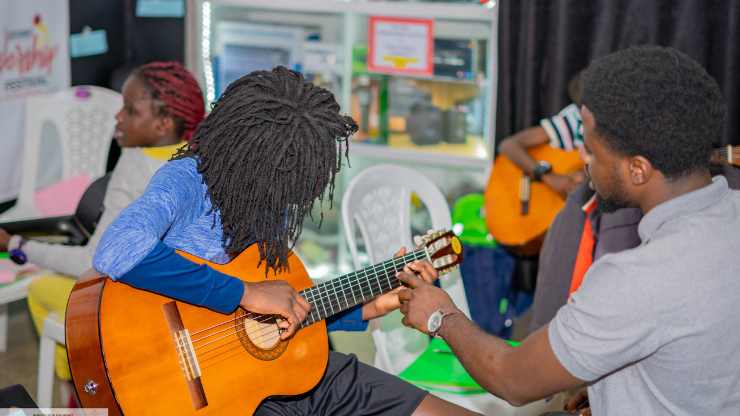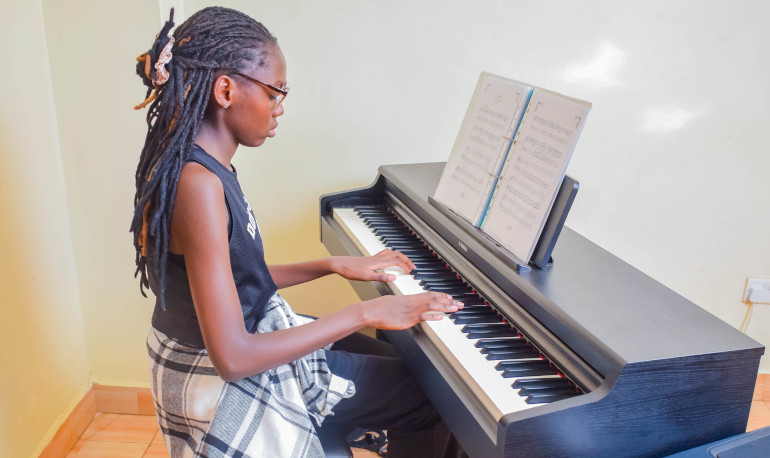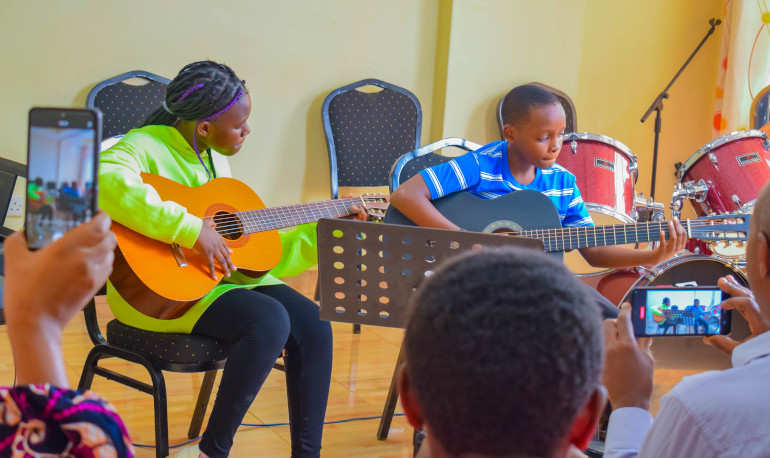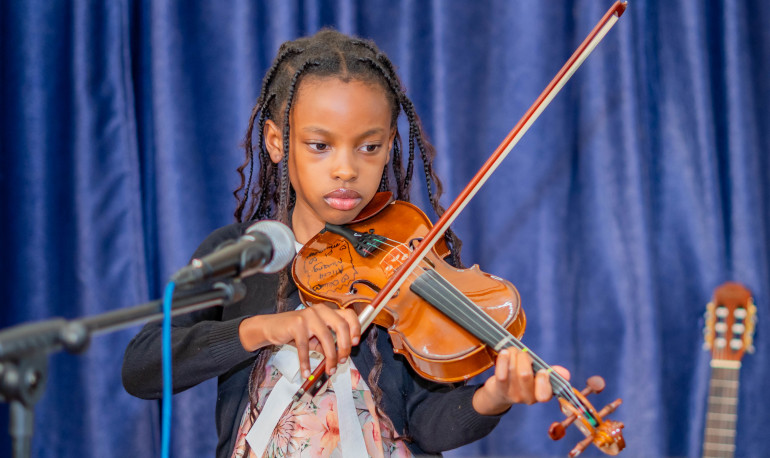Nurturing Musical Talents: Unveiling the Best Music Schools in Nairobi for Aspiring Artists
Cheza Music
Dec 18, 2023 at 4:54 pm
0 Comments

Are you a budding musician in Nairobi or a parent to a promising musician? In this article, we unveil the best music schools in the city tailored for aspiring artists. Renowned for their top-notch training and guidance, these institutions provide the ideal environment for developing your musical skills and reaching your full potential. Whether you seek classical elegance or contemporary flair, there's a music school ready to help you cultivate your talent..
Are you a budding musician in Nairobi seeking to unlock your musical talents?
Look no further, as we unveil the best music schools in the city that cater to aspiring artists like you.
These renowned institutions offer top-notch training and guidance to help you develop your musical skills and reach your full potential.
Nairobi, being a vibrant and diverse city, is home to a variety of music schools that cater to different genres and styles.
Whether you need classical or contemporary musical options, there is a music school in the city that can help you cultivate your talent.
From one-on-one lessons with experienced instructors to group classes and performance opportunities, these music schools provide a comprehensive learning experience for aspiring musicians.
You will have access to state-of-the-art facilities, practice rooms, and a supportive community of fellow musicians who share your passion for music.
So, if you're ready to take your musical journey to the next level, join us as we uncover the best music schools in Nairobi.
Factors to consider when choosing a music school
Formal music education plays a crucial role in the development of aspiring musicians.
It provides a structured learning environment that allows students to acquire the necessary skills and knowledge to excel in their chosen musical discipline.
Here are some of the reasons why pursuing a music education is essential for unlocking your musical talents, and things to consider when looking for a music school
- Technical Proficiency: Music schools offer comprehensive training programs that focus on developing technical proficiency in areas such as instrument playing, vocal techniques, music theory, and composition. These skills form the foundation of a successful musical career and allow aspiring artists to express themselves artistically.
- Musical Theory and Analysis: Understanding music theory and analysis is essential for any aspiring musician. Music schools provide in-depth courses that cover topics such as harmony, rhythm, melody, and form. This knowledge enables musicians to interpret and perform music with greater depth and understanding.
- Performance Opportunities: Music schools often organize recitals, concerts, and competitions, providing students with valuable performance opportunities. These experiences help build confidence, stage presence, and the ability to connect with an audience. Performing in front of peers and industry professionals can also lead to networking and career advancement opportunities.
- Networking and Collaboration: Music schools bring together a diverse community of musicians, creating opportunities for collaboration and networking. Working with fellow students and instructors allows aspiring artists to learn from each other, exchange ideas, and potentially form partnerships that can enhance their musical careers.
- Industry Exposure: Music schools often invite guest lecturers, industry professionals, and renowned musicians to conduct workshops and masterclasses. These interactions provide invaluable insights into the music industry, current trends, and career opportunities. Students, teachers, and parents can gain mentorship and guidance from experts who have achieved success in their respective fields.
Top music schools in Nairobi
Choosing the right music school is crucial for your musical journey. Here are some factors to consider when making your decision:
- Specialization: Different music schools have different areas of specialization. Consider your preferred genre or instrument and choose a school that offers a strong program in that area. Look for schools that have a reputation for excellence in your chosen field.
- Faculty and Staff: Research the qualifications and experience of the faculty and staff at the music school. Experienced and knowledgeable instructors can make a significant difference in your learning experience. Look for instructors who have a track record of success and who are actively involved in the music industry.
- Facilities and Resources: Look for music schools that have state-of-the-art facilities, practice rooms, recording studios, and performance spaces. Access to quality instruments, equipment, and resources can greatly enhance your learning experience. Additionally, consider the availability of libraries, music archives, and digital resources that can support your musical education.
- Curriculum and Courses: Review the curriculum and courses offered by the music school. Ensure that they align with your musical goals and interests. Look for schools that offer a balanced mix of theoretical and practical courses, as well as opportunities for performance and collaboration.
- Student Support Services: Consider the availability of student support services such as career counseling, academic advising, and performance coaching. These services can provide guidance and support throughout your musical journey.
- Accessibility and convenience: Schools can be either located in an easy-to-access location or offer convenience such as in-home lessons to relieve the pain of traffic jam, parking and waiting.
Music programs and courses offered by the 2 best schools in Nairobi
Now that we've discussed the importance of formal music education and the factors to consider when choosing a music school, let's explore some of the best music schools in Nairobi:
- Kenya Conservatoire of Music: The Kenya Conservatoire of Music is renowned for its high standards and rigorous training programs. They offer a wide range of courses in classical music, jazz, and traditional African music. The conservatoire boasts a talented faculty, many of whom are accomplished musicians themselves. Students have the opportunity to participate in ensemble performances, masterclasses, and international music festivals. The Kenya Conservatoire of Music is committed to nurturing well-rounded musicians who are equipped for success in the music industry.
- Cheza Music School: Cheza Music School is renowned for its emphasis on in-home quality music lessons that are done at learner's homes. Their programs cover classical and contemporary piano, guitar, voice, violin, trumpet and drums. Cheza Music School has an awesome faculty that goes through regular training to improve their teaching methods. It is popular for its lesson planning system where every learner receives their lesson plan before every lesson. This way, tracking of progress becomes very easy. The students at Cheza Music School have the opportunity to participate in ensemble performances on scheduled weekends, master classes, holiday camps, recitals and concerts. Cheza Music School is the best option for in-home lessons if you have a busy schedule.
Popular courses at the music schools
Let's take a closer look at the music programs and courses offered by each of the top music schools in Nairobi:
- Kenya Conservatoire of Music:
- Classical music courses: Piano, violin, cello, flute, clarinet, oboe, trumpet, trombone, and more.
- Jazz courses: Piano, saxophone, trumpet, trombone, bass, and drums.
- Music theory and analysis.
- Chamber music and orchestral training.
- Music education and pedagogy.
- Cheza Music School
- Classical music courses: Piano, guitar, violin, trumpet, and voice.
- Contemporary music courses: Piano, guitar, violin, trumpet, voice, and drums.
- Traditional music courses: Nyatiti, Obokano, Chivoti, Orutu, and Kiring'ong'o
- Ensemble playing
- Children choral training
- Music theory (online)
Faculty and staff at the music schools
The faculty and staff at the top music schools in Nairobi are highly qualified and experienced professionals who are dedicated to nurturing the talents of aspiring musicians. Here are some notable instructors at each school:
- Kenya Conservatoire of Music:
- Jacinta Mulaku: Concert pianist and director at Kenya Conservatoire of Music.
- Manaseh Uzele: Performing guitarist and director of guitar department
- Masala Sefu: Performing cellist and founder of Cellobration
- Cheza Music School
- Josiah Birai: Pianist and director at Cheza Music School
- Kennedy Macheru: Multi-talented performer and expert children instructor
- Baruch Cheleget: Performing violinist and expert instructor, head of violin department
Facilities and resources available to students
The top music schools in Nairobi provide students with access to state-of-the-art facilities and resources to support their musical education. Here are some of the facilities and resources available:
- Practice Rooms: Equipped with quality instruments and audio equipment, practice rooms allow students to hone their skills in a dedicated and acoustically optimized environment.
- Performance Spaces: Music schools often have dedicated performance spaces, concert halls, and auditoriums where students can showcase their talents and gain valuable stage experience.
- Digital Resources: Many music schools provide access to online platforms and software that facilitate music composition, notation, and production.
Success stories of musicians who attended these schools
Several successful musicians have emerged from the top music schools in Nairobi, showcasing the impact of their education and training. Here are a few notable success stories:
- Eric Wainaina: Eric Wainaina, a Kenyan singer-songwriter, attended the Kenya Conservatoire of Music. He has achieved international recognition for his unique blend of African rhythms, pop, and folk music. Eric's music has garnered awards and critical acclaim, and he continues to inspire aspiring musicians in Kenya and beyond.
- Although Cheza Music School is an upcoming school, we foresee great musicians springing up from the quality music education that they offer.
Scholarships and financial aid options
The cost of music education can be a significant barrier for some aspiring musicians. However, many music schools in Nairobi offer scholarships and financial aid options to help students pursue their dreams. Here are some of the scholarships and financial aid programs available:
- Merit-Based Scholarships: These scholarships are awarded to students based on their musical talent, academic performance, and potential. They cover part or all of the tuition fees and may also include additional benefits such as mentorship and performance opportunities.
- Need-Based Financial Aid: Music schools offer financial aid programs for students who demonstrate financial need. These programs aim to make music education more accessible by providing assistance with tuition fees, instrument rental, and other related expenses.
- Work-Study Programs: Some music schools provide work-study opportunities, allowing students to work part-time within the school in exchange for reduced tuition fees or other benefits.
It is important to research and inquire about the specific scholarships and financial aid options available at each music school.
0 Comments
Categories
|
News |
|
Events |
|
Activity |
Popular Courses

Piano Lessons in Nairobi | Learn Piano At Home Course
We provide piano lessons in Nairobi suitable for children aged 4 and above, as well as adults. Our l...

Guitar Lessons In Nairobi | Learn Guitar At Home Course
Our guitar lessons in Nairobi offer progressive lessons for children from 6 years old and ...

Violin Lessons In Nairobi | Learn Violin At Home Course
We provide violin lessons in Nairobi for kids (6 years and older) and adults. Our lessons cover ever...
Working Hours
Depending on individual teachers since we do homeschooling.
© Copyright 2025Privacy Policy | Developer & SEO Services: Josiah Birai (JoeSEO): 0765 356000




Log in to comment